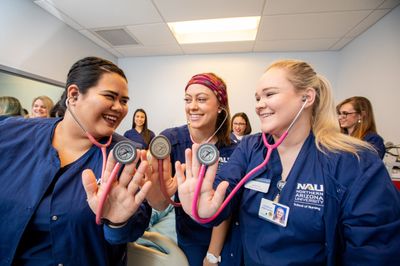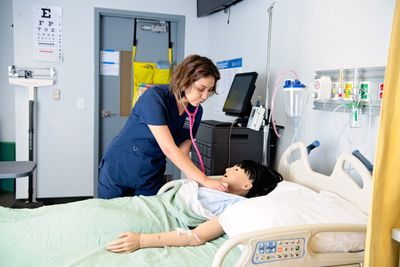Support the next generation of nurses
Your generosity helps shape the future of nursing. When you give, you’re supporting students, expanding access, and strengthening communities through compassionate care.

At NAU’s Maria and Steve Sanghi College of Nursing (CON), your compassion becomes your career. With expert faculty, real-world clinical training, and a commitment to culturally responsive care, you’ll graduate ready to make a difference wherever you’re needed most.
#1 most affordable online RN-to-BSN program in Arizona
#2 RN-to-BSN program in Arizona
NCLEX exam pass rates of NAU Nursing students are consistently over 90%
Nursing takes heart. At NAU, you’ll learn to care for others while being supported yourself. From your first class to your first patient, you’ll be guided by mentors who understand the balance of science, empathy, and resilience.
Study close to home or where you want to serve. NAU offers nursing programs in Flagstaff, Tucson, Phoenix (North Valley), Yuma, and online. Coursework is grounded in the realities of Arizona’s communities, and our simulation labs prepare you for clinical care with confidence. You’ll be backed by expert instructors, academic advisors, and wellness resources from your first day through the day you pass your licensure exam.
| Degree | Flagstaff | North Valley | Online | Tucson | Yuma | Partnered community colleges |
| BS in Nursing – Traditional | X | X | X | |||
| BS in Nursing – Compressed | X | X | X | X | ||
| BS in Nursing- Global Format | X | X | ||||
| BS in Nursing – American Indian Program | X | |||||
| BS in Nursing – Accelerated | X | |||||
| Associate to BS in Nursing | X | |||||
| RN to BS in Nursing (online) | X | |||||
| Concurrent Enrollment Program (CEP) | X |
| Degree and certificates | Online |
| Nursing - Advanced Practice, Master of Science (Family Nurse Practitioner & Psychiatric Mental Health Nurse Practitioner tracks) | X |
| Family Nurse Practitioner Graduate Certificate | X |
| Psychiatric Mental Health Nurse Practitioner Graduate Certificate | X |
| Clinical Nurse Specialist – Prescribing | X |
| Doctor of Nursing Practice | X |
Our students are united by a shared purpose: to care for others and uplift their communities. Whether you work in hospitals, clinics, schools, or public health, you’ll carry that mission forward. NAU is nationally recognized for its work with Indigenous and rural populations. We partner closely with tribal communities to reduce health disparities, improve care, and support Native American students through culturally informed education and mentorship. After earning your BSN, you can continue your journey through NAU’s graduate nursing programs and prepare for advanced roles in leadership, education, and clinical practice.
NAU nursing students consistently achieve pass rates above 90% on the National Council Licensure Examination (NCLEX), demonstrating the high quality and effectiveness of CON’s academic preparation and student support.
Our state-of-the-art labs let you practice real scenarios in a safe, supportive environment so you build skills and confidence before you ever step into clinical care.
CON is uniquely positioned and embedded in the communities we serve. With a focus on rural and Indigenous health, our programs train nurses who are ready to bridge gaps in access, equity, and outcomes.
Apply to one of Arizona’s most respected nursing programs and begin your path to making a difference in health care.
Embark on a traditional university track where nursing courses are taken over four semesters (summers off). If you are deemed to be eligible for the program, you will be asked to take the HESI A2 admission exam. Admissions decisions are distributed 4-6 weeks after the application deadline to your NAU email address.
Campus Availability: Flagstaff, Tucson, Yuma
Our American Indian Nursing Program offers another pathway to the Traditional BSN degree, with priority given to individuals who are members of federally recognized tribes.If you are deemed to be eligible for the program, you will be asked to take the HESI A2 admission exam. Admissions decisions are distributed 4-6 weeks after the application deadline to your NAU email address.
The Maria and Steve Sanghi College of Nursing offers a compressed BSN program completed in four semesters, including summers. If you are deemed to be eligible for the program, you will be asked to take the HESI A2 admission exam. Admissions decisions are distributed 4-6 weeks after the application deadline to your NAU email address.
If you already have a bachelor’s degree from a regionally accredited college and have completed your prerequisites, you are eligible to apply for our Accelerated BSN Program.
Campus availability: North Valley
Students currently enrolled in an associate degree in nursing can enter this online program in any semester/block before completing their AAS degree.
Students who are admitted into an Arizona Community College nursing program for their Associate of Applied Science (AAS) degree will start with NAU a semester prior. The CEP is an opportunity for you to graduate with both degrees in the same month. Dual enrollment for financial aid is available.
Nurses who have graduated with their AAS degree and hold an unencumbered U.S. RN license may pursue this online option.
Apply to NAU as a transfer student and send your transcripts to University Admissions.
After you’re accepted as a student to NAU, Associate to BSN and RN to BSN students must also complete the supplemental application. A second application is not required for CEP.
You’ll be welcomed into a close-knit community where faculty know you by name and support your growth every step of the way. Through high-impact experiences like simulation labs and clinical placements, our faculty empower future nurses to lead with confidence and compassion. Meet the educators who’ll help you thrive, personally, and professionally.


"The reason that I chose the NAU nursing program is because of the wide variety of clinical experiences that are offered. Additionally, the small class sizes allow for more hands-on experience and personalized learning from instructors."


Your journey in nursing starts here. Whether you're beginning or building on your experience, the path forward is clear, and we're with you every step of the way.

Your generosity helps shape the future of nursing. When you give, you’re supporting students, expanding access, and strengthening communities through compassionate care.

The baccalaureate degree program in nursing, master’s degree programs in nursing, Doctor of Nursing Practice program, and postgraduate APRN certificate program at Northern Arizona University are accredited by the Commission on Collegiate Nursing Education.
Explore the Maria and Steve Sanghi College of Nursing’s accredited programs.